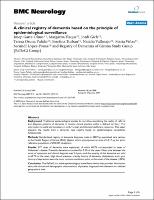Resum
Paraules clau
Malaltia d'Alzheimer; Demència; Registres
Citació recomanada
Garre-Olmo J, Flaqué M, Gich J, Osuna Pulido T, Turbau J, Vallmajo N, et al. A clinical registry of dementia based on the principle of epidemiological surveillance. BMC Neurol. 2009 Jan 28;9:5.
Audiència
Professionals
Empreu aquest identificador per citar i/o enllaçar aquest document
https://hdl.handle.net/11351/9541Aquest element apareix a les col·leccions següents
Els següents fitxers sobre la llicència estan associats a aquest element:


